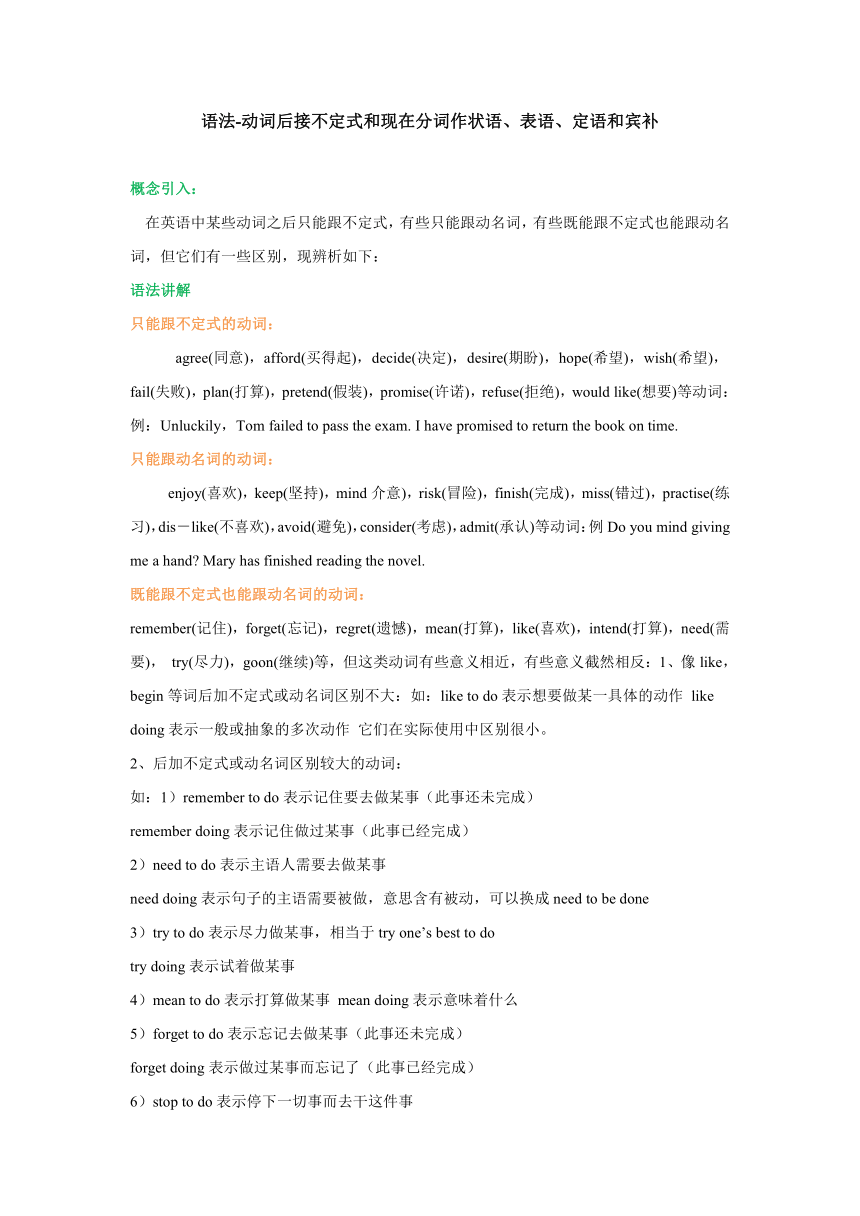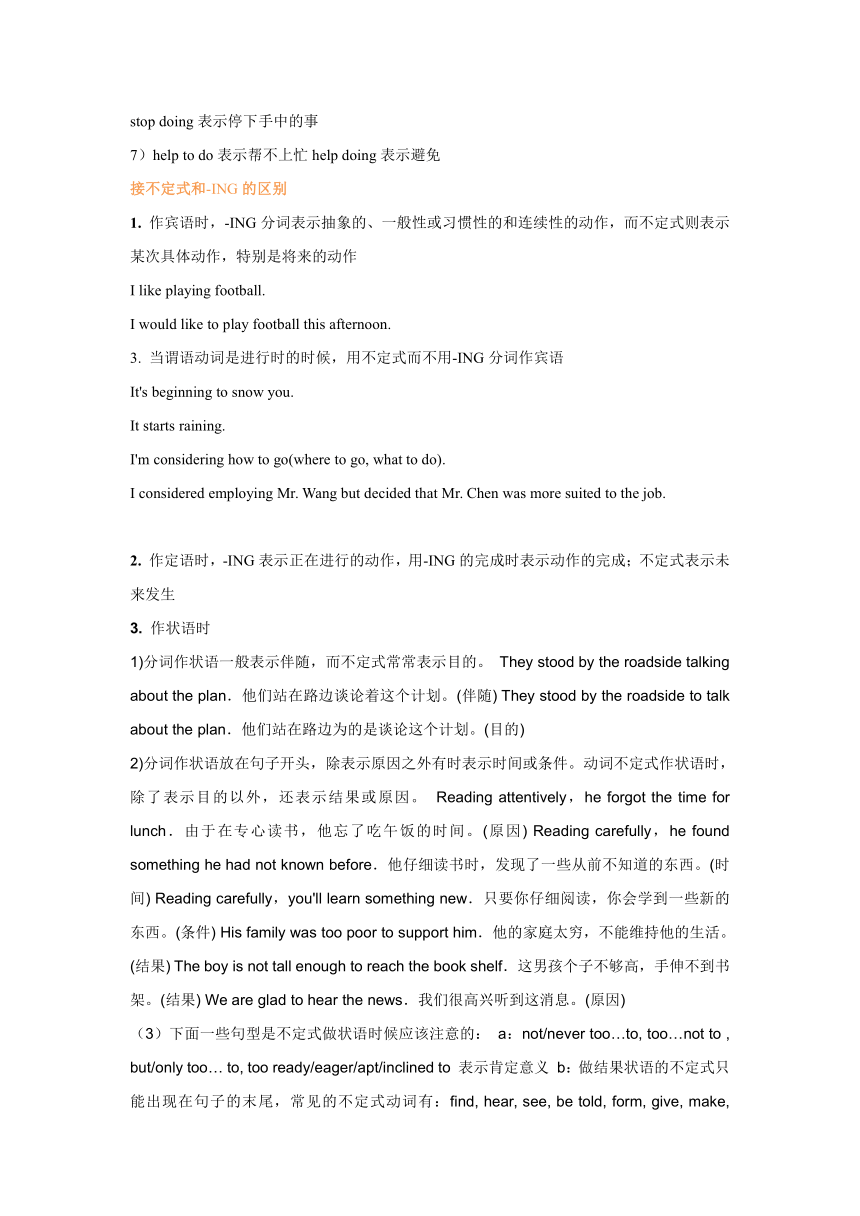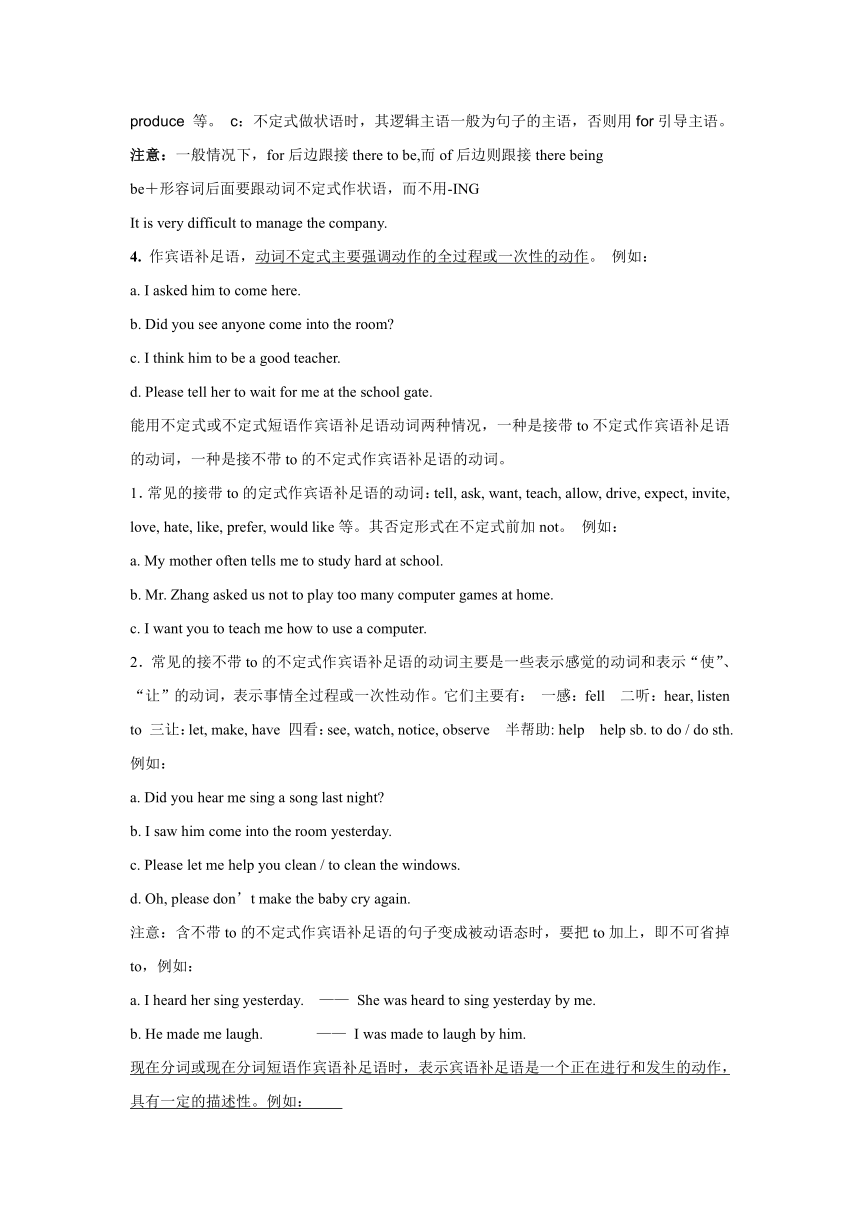北师大版高中英语模块4 Unit 12 Culture 动词后接不定式和现在分词作状语、表语、定语和宾补
文档属性
| 名称 | 北师大版高中英语模块4 Unit 12 Culture 动词后接不定式和现在分词作状语、表语、定语和宾补 |  | |
| 格式 | zip | ||
| 文件大小 | 24.1KB | ||
| 资源类型 | 教案 | ||
| 版本资源 | 北师大版 | ||
| 科目 | 英语 | ||
| 更新时间 | 2019-11-11 22:18:14 | ||
图片预览



文档简介
语法-动词后接不定式和现在分词作状语、表语、定语和宾补
概念引入:
在英语中某些动词之后只能跟不定式,有些只能跟动名词,有些既能跟不定式也能跟动名词,但它们有一些区别,现辨析如下: 语法讲解
只能跟不定式的动词:
agree(同意),afford(买得起),decide(决定),desire(期盼),hope(希望),wish(希望),fail(失败),plan(打算),pretend(假装),promise(许诺),refuse(拒绝),would like(想要)等动词:例:Unluckily,Tom failed to pass the exam. I have promised to return the book on time. 只能跟动名词的动词:
enjoy(喜欢),keep(坚持),mind介意),risk(冒险),finish(完成),miss(错过),practise(练习),dis-like(不喜欢),avoid(避免),consider(考虑),admit(承认)等动词:例Do you mind giving me a hand? Mary has finished reading the novel. 既能跟不定式也能跟动名词的动词: remember(记住),forget(忘记),regret(遗憾),mean(打算),like(喜欢),intend(打算),need(需要), try(尽力),goon(继续)等,但这类动词有些意义相近,有些意义截然相反:1、像like,begin等词后加不定式或动名词区别不大:如:like to do表示想要做某一具体的动作 like doing表示一般或抽象的多次动作 它们在实际使用中区别很小。 2、后加不定式或动名词区别较大的动词: 如:1)remember to do表示记住要去做某事(此事还未完成) remember doing表示记住做过某事(此事已经完成) 2)need to do表示主语人需要去做某事 need doing表示句子的主语需要被做,意思含有被动,可以换成need to be done 3)try to do表示尽力做某事,相当于try one’s best to do try doing表示试着做某事
4)mean to do表示打算做某事 mean doing表示意味着什么 5)forget to do表示忘记去做某事(此事还未完成) forget doing表示做过某事而忘记了(此事已经完成) 6)stop to do表示停下一切事而去干这件事 stop doing表示停下手中的事 7)help to do表示帮不上忙help doing表示避免
接不定式和-ING的区别
1. 作宾语时,-ING分词表示抽象的、一般性或习惯性的和连续性的动作,而不定式则表示某次具体动作,特别是将来的动作
I like playing football.
I would like to play football this afternoon.
3. 当谓语动词是进行时的时候,用不定式而不用-ING分词作宾语
It's beginning to snow you.
It starts raining.
I'm considering how to go(where to go, what to do).
I considered employing Mr. Wang but decided that Mr. Chen was more suited to the job.
2. 作定语时,-ING表示正在进行的动作,用-ING的完成时表示动作的完成;不定式表示未来发生
3. 作状语时
1)分词作状语一般表示伴随,而不定式常常表示目的。 They stood by the roadside talking about the plan.他们站在路边谈论着这个计划。(伴随) They stood by the roadside to talk about the plan.他们站在路边为的是谈论这个计划。(目的)
2)分词作状语放在句子开头,除表示原因之外有时表示时间或条件。动词不定式作状语时,除了表示目的以外,还表示结果或原因。 Reading attentively,he forgot the time for lunch.由于在专心读书,他忘了吃午饭的时间。(原因) Reading carefully,he found something he had not known before.他仔细读书时,发现了一些从前不知道的东西。(时间) Reading carefully,you'll learn something new.只要你仔细阅读,你会学到一些新的东西。(条件) His family was too poor to support him.他的家庭太穷,不能维持他的生活。(结果) The boy is not tall enough to reach the book shelf.这男孩个子不够高,手伸不到书架。(结果) We are glad to hear the news.我们很高兴听到这消息。(原因)
(3)下面一些句型是不定式做状语时候应该注意的: a:not/never too…to, too…not to , but/only too… to, too ready/eager/apt/inclined to 表示肯定意义 b:做结果状语的不定式只能出现在句子的末尾,常见的不定式动词有:find, hear, see, be told, form, give, make, produce 等。 c:不定式做状语时,其逻辑主语一般为句子的主语,否则用for引导主语。
注意:一般情况下,for后边跟接there to be,而of后边则跟接there being
be+形容词后面要跟动词不定式作状语,而不用-ING
It is very difficult to manage the company.
4. 作宾语补足语,动词不定式主要强调动作的全过程或一次性的动作。 例如:
a. I asked him to come here.
b. Did you see anyone come into the room?
c. I think him to be a good teacher.
d. Please tell her to wait for me at the school gate.
能用不定式或不定式短语作宾语补足语动词两种情况,一种是接带to不定式作宾语补足语的动词,一种是接不带to的不定式作宾语补足语的动词。
1.常见的接带to的定式作宾语补足语的动词:tell, ask, want, teach, allow, drive, expect, invite, love, hate, like, prefer, would like等。其否定形式在不定式前加not。 例如:
a. My mother often tells me to study hard at school.
b. Mr. Zhang asked us not to play too many computer games at home.
c. I want you to teach me how to use a computer.
2.常见的接不带to的不定式作宾语补足语的动词主要是一些表示感觉的动词和表示“使”、“让”的动词,表示事情全过程或一次性动作。它们主要有: 一感:fell 二听:hear, listen to 三让:let, make, have 四看:see, watch, notice, observe 半帮助: help help sb. to do / do sth. 例如:
a. Did you hear me sing a song last night?
b. I saw him come into the room yesterday.
c. Please let me help you clean / to clean the windows.
d. Oh, please don’t make the baby cry again.
注意:含不带to的不定式作宾语补足语的句子变成被动语态时,要把to加上,即不可省掉to,例如:
a. I heard her sing yesterday. —— She was heard to sing yesterday by me.
b. He made me laugh. —— I was made to laugh by him.
现在分词或现在分词短语作宾语补足语时,表示宾语补足语是一个正在进行和发生的动作,具有一定的描述性。例如:
a. Did you hear me singing an English song at this time last night?
b. I saw him watching TV when I came back from school yesterday.
c. When Edison’s father came into the room, he saw Edison sitting on some eggs.
d. Who makes the baby crying?
5. 在remember, forget等词后,如果跟-ING分词,表示-ING分词的动作发生在主要谓语之前;如果跟不定式则表示不定式的动作发生在主要谓语动作之后
I remember telling her that last night. (“告诉”发生在“记得”之前)
He remembered to tell her that when she came back. (“记得”发生在“告诉”之前)
I'm sorry I forgot to give you the message. (主语动词表示的动作“忘记”发生在不定式表示的动作“给带口信”之前)
Why! I have such a bad memory. I forgot giving the message last night. (-ING分词示的动作“给带口信”发生在谓语动词表的动作“忘记”之前)
6. stop, go on和leave off之后跟接动词不定式和-ING分词所表达的意义有所不同
They stopped (talking) to work. [停下(其他动作)来工作]
They stopped working. [停下工作(来干其他动作)]
Workers went on discussing the problem. [工人继续讨论这一问题]
Workers went on to discuss the problem.[工人们停下来其他事,继续讨论这一问题]
He left off writing.[他停下写作(去干其他事)]
He left off to write.[他停下(其他事)来写作]
7. … used to后跟不定式和-ING分词,后跟不定式有两种情况:一种是used to是固定用法表示“过去经常干……”;另外一种情况是use的被动词态“be used”后跟不定式;后跟-ING分词的情况有一种,那就是当used to中的used是形容词时,to后跟名词或-ING分词
巩固练习
用下列所给动词的适当形式填空
1. Where are you considering _________(go)for the summer vacation?
2. The windows were never opened except _______(air)the room for a few minutes in the morning.
3. I think I’ll have to give up _________(play)football __________(prepare)for the examination.
4. His words left me __________(wonder)about his real purpose.
5. Remember_________(call) me when you arrive.
6. Sorry, we don’t allow ________(smoke)in the waiting room.
7. ________(expose)to the sunlight for a long time will harm your skin.
8.__________(blame)can hardly make little John realise his mistakes.
完成句子
1. 我后悔向你撒谎,但我并不是有意的。(regret)
_____________________________, but I didn’t mean to.
2. 他的突然到来把我们所有的计划全打乱了。(come)
_____________________________ disturbed all our plans.
3. 他正考虑扩大他的生意。(consider)
He _____________________________his own business.
4. 为避免被车撞上,他不得不来了个急拐弯。(avoid)
__________________________________________, he had to make a sharp turn.
5. 现在孩子们在计算机游戏上花了太多的时间。(devote)
Nowadays, children devote too much time _________________
单项填空
1. —You were brave enough to raise objections(反对)at the meeting.
—Well, now I regret ____that.
A. to do B. to be doing C. to have done D. having done
2. It is very cold outside. I feel like _____something hot.
A. to drink B. drunk C. drinking D. drinks
3. I know he didn’t listen to me, but I went on ____to get him ____in the project.
A. to hope; interesting B. to hope; interested
C. hoping; interested D. hoping; interesting
4. —What are you busy doing these days?
—____the final examinations.
A. To prepare myself for B. Preparing myself for
C. To make preparations for D. Myself preparing
5. I enjoy ____English aloud in the morning and my oral English has greatly improved.
A. to practise reading B. practising reading
C. to practise to read D. practising to read
6. —What makes him so happy?
—______a prize in the computer contest.
A. Because of winning B. For he won
C. Winning D. He won
7. It is no use ____without thorough(彻底的)_____________.
A. to read; understood B. reading; understanding
C. to read; understand D. read; to understand
8. Some schools in Shanghai have moved one step closer to ____with the global education community.
A. being connected B. connect
C. having been connected D. be connected
9. ____made the student _____interest in his studies.
A. Being punished; to lose B. Punished; lose
C. Being punished; lose D. Having been punished; lost
10._____ the homework made his father lose his temper.
A. The boy’s not having done B. The boy not having done
C. The boy’s having not done D. The boy having not done
答案与解析:
用下列所给动词的适当形式填空
1. going 2. to air 3. Playing;to prepare 4. wondering
5. to call 6. smoking 7. Being exposed 8. Blaming
完成句子
1. I regretted telling lies to you 2. His sudden coming 3. is considering building up
4. To avoid the car hitting him/To avoid being hit by the car 5. to playing computer games.
单项填空
1. 【解析】选D。regret后接动名词表示“后悔做过某事”;后接不定式时,表示“为要做的事表示遗憾或歉意”。
2. 【解析】选C。feel like后只能用动名词作宾语。
3. 【解析】选C。go on doing sth. 继续做某事;get sb. interested in. . . 使得某人对……感兴趣,interested用以修饰人。
4.【解析】选B。考查非谓语动词的用法。be busy doing sth. 忙于做某事; prepare oneself for sth. 准备做某事。答语是省略句。完整句子应是“I’m busy preparing myself for the final examinations. ”。
5.【解析】选B。enjoy和practise后面接的宾语为动词时,都应该用动名词形式。
6.【解析】选C。通过问句what可知,答语应是名词或兼有名词性质的词,答语为省略形式,完整句子应是“Winning a prize in the computer contest makes him so happy. ”故选C。
7.【解析】选B。考查非谓语动词的用法。It’s no use doing sth. 做某事是无用的;without是介词,后接动名词形式作宾语,故选B。
8.【解析】选A。close to中to是介词,后接动名词,be connected with与……连接,与……联系。
9.【解析】选C。考查非谓语动词。分析句子结构可知,第一个空在句中作主语,且punish与the student之间是动宾关系,make sb. do sth. 使/让某人做某事。
10.【解析】选A。考查动名词的复合结构及否定形式。名词的所有格加上动名词构成动名词的复合结构。not+动名词构成动名词的否定式。
概念引入:
在英语中某些动词之后只能跟不定式,有些只能跟动名词,有些既能跟不定式也能跟动名词,但它们有一些区别,现辨析如下: 语法讲解
只能跟不定式的动词:
agree(同意),afford(买得起),decide(决定),desire(期盼),hope(希望),wish(希望),fail(失败),plan(打算),pretend(假装),promise(许诺),refuse(拒绝),would like(想要)等动词:例:Unluckily,Tom failed to pass the exam. I have promised to return the book on time. 只能跟动名词的动词:
enjoy(喜欢),keep(坚持),mind介意),risk(冒险),finish(完成),miss(错过),practise(练习),dis-like(不喜欢),avoid(避免),consider(考虑),admit(承认)等动词:例Do you mind giving me a hand? Mary has finished reading the novel. 既能跟不定式也能跟动名词的动词: remember(记住),forget(忘记),regret(遗憾),mean(打算),like(喜欢),intend(打算),need(需要), try(尽力),goon(继续)等,但这类动词有些意义相近,有些意义截然相反:1、像like,begin等词后加不定式或动名词区别不大:如:like to do表示想要做某一具体的动作 like doing表示一般或抽象的多次动作 它们在实际使用中区别很小。 2、后加不定式或动名词区别较大的动词: 如:1)remember to do表示记住要去做某事(此事还未完成) remember doing表示记住做过某事(此事已经完成) 2)need to do表示主语人需要去做某事 need doing表示句子的主语需要被做,意思含有被动,可以换成need to be done 3)try to do表示尽力做某事,相当于try one’s best to do try doing表示试着做某事
4)mean to do表示打算做某事 mean doing表示意味着什么 5)forget to do表示忘记去做某事(此事还未完成) forget doing表示做过某事而忘记了(此事已经完成) 6)stop to do表示停下一切事而去干这件事 stop doing表示停下手中的事 7)help to do表示帮不上忙help doing表示避免
接不定式和-ING的区别
1. 作宾语时,-ING分词表示抽象的、一般性或习惯性的和连续性的动作,而不定式则表示某次具体动作,特别是将来的动作
I like playing football.
I would like to play football this afternoon.
3. 当谓语动词是进行时的时候,用不定式而不用-ING分词作宾语
It's beginning to snow you.
It starts raining.
I'm considering how to go(where to go, what to do).
I considered employing Mr. Wang but decided that Mr. Chen was more suited to the job.
2. 作定语时,-ING表示正在进行的动作,用-ING的完成时表示动作的完成;不定式表示未来发生
3. 作状语时
1)分词作状语一般表示伴随,而不定式常常表示目的。 They stood by the roadside talking about the plan.他们站在路边谈论着这个计划。(伴随) They stood by the roadside to talk about the plan.他们站在路边为的是谈论这个计划。(目的)
2)分词作状语放在句子开头,除表示原因之外有时表示时间或条件。动词不定式作状语时,除了表示目的以外,还表示结果或原因。 Reading attentively,he forgot the time for lunch.由于在专心读书,他忘了吃午饭的时间。(原因) Reading carefully,he found something he had not known before.他仔细读书时,发现了一些从前不知道的东西。(时间) Reading carefully,you'll learn something new.只要你仔细阅读,你会学到一些新的东西。(条件) His family was too poor to support him.他的家庭太穷,不能维持他的生活。(结果) The boy is not tall enough to reach the book shelf.这男孩个子不够高,手伸不到书架。(结果) We are glad to hear the news.我们很高兴听到这消息。(原因)
(3)下面一些句型是不定式做状语时候应该注意的: a:not/never too…to, too…not to , but/only too… to, too ready/eager/apt/inclined to 表示肯定意义 b:做结果状语的不定式只能出现在句子的末尾,常见的不定式动词有:find, hear, see, be told, form, give, make, produce 等。 c:不定式做状语时,其逻辑主语一般为句子的主语,否则用for引导主语。
注意:一般情况下,for后边跟接there to be,而of后边则跟接there being
be+形容词后面要跟动词不定式作状语,而不用-ING
It is very difficult to manage the company.
4. 作宾语补足语,动词不定式主要强调动作的全过程或一次性的动作。 例如:
a. I asked him to come here.
b. Did you see anyone come into the room?
c. I think him to be a good teacher.
d. Please tell her to wait for me at the school gate.
能用不定式或不定式短语作宾语补足语动词两种情况,一种是接带to不定式作宾语补足语的动词,一种是接不带to的不定式作宾语补足语的动词。
1.常见的接带to的定式作宾语补足语的动词:tell, ask, want, teach, allow, drive, expect, invite, love, hate, like, prefer, would like等。其否定形式在不定式前加not。 例如:
a. My mother often tells me to study hard at school.
b. Mr. Zhang asked us not to play too many computer games at home.
c. I want you to teach me how to use a computer.
2.常见的接不带to的不定式作宾语补足语的动词主要是一些表示感觉的动词和表示“使”、“让”的动词,表示事情全过程或一次性动作。它们主要有: 一感:fell 二听:hear, listen to 三让:let, make, have 四看:see, watch, notice, observe 半帮助: help help sb. to do / do sth. 例如:
a. Did you hear me sing a song last night?
b. I saw him come into the room yesterday.
c. Please let me help you clean / to clean the windows.
d. Oh, please don’t make the baby cry again.
注意:含不带to的不定式作宾语补足语的句子变成被动语态时,要把to加上,即不可省掉to,例如:
a. I heard her sing yesterday. —— She was heard to sing yesterday by me.
b. He made me laugh. —— I was made to laugh by him.
现在分词或现在分词短语作宾语补足语时,表示宾语补足语是一个正在进行和发生的动作,具有一定的描述性。例如:
a. Did you hear me singing an English song at this time last night?
b. I saw him watching TV when I came back from school yesterday.
c. When Edison’s father came into the room, he saw Edison sitting on some eggs.
d. Who makes the baby crying?
5. 在remember, forget等词后,如果跟-ING分词,表示-ING分词的动作发生在主要谓语之前;如果跟不定式则表示不定式的动作发生在主要谓语动作之后
I remember telling her that last night. (“告诉”发生在“记得”之前)
He remembered to tell her that when she came back. (“记得”发生在“告诉”之前)
I'm sorry I forgot to give you the message. (主语动词表示的动作“忘记”发生在不定式表示的动作“给带口信”之前)
Why! I have such a bad memory. I forgot giving the message last night. (-ING分词示的动作“给带口信”发生在谓语动词表的动作“忘记”之前)
6. stop, go on和leave off之后跟接动词不定式和-ING分词所表达的意义有所不同
They stopped (talking) to work. [停下(其他动作)来工作]
They stopped working. [停下工作(来干其他动作)]
Workers went on discussing the problem. [工人继续讨论这一问题]
Workers went on to discuss the problem.[工人们停下来其他事,继续讨论这一问题]
He left off writing.[他停下写作(去干其他事)]
He left off to write.[他停下(其他事)来写作]
7. … used to后跟不定式和-ING分词,后跟不定式有两种情况:一种是used to是固定用法表示“过去经常干……”;另外一种情况是use的被动词态“be used”后跟不定式;后跟-ING分词的情况有一种,那就是当used to中的used是形容词时,to后跟名词或-ING分词
巩固练习
用下列所给动词的适当形式填空
1. Where are you considering _________(go)for the summer vacation?
2. The windows were never opened except _______(air)the room for a few minutes in the morning.
3. I think I’ll have to give up _________(play)football __________(prepare)for the examination.
4. His words left me __________(wonder)about his real purpose.
5. Remember_________(call) me when you arrive.
6. Sorry, we don’t allow ________(smoke)in the waiting room.
7. ________(expose)to the sunlight for a long time will harm your skin.
8.__________(blame)can hardly make little John realise his mistakes.
完成句子
1. 我后悔向你撒谎,但我并不是有意的。(regret)
_____________________________, but I didn’t mean to.
2. 他的突然到来把我们所有的计划全打乱了。(come)
_____________________________ disturbed all our plans.
3. 他正考虑扩大他的生意。(consider)
He _____________________________his own business.
4. 为避免被车撞上,他不得不来了个急拐弯。(avoid)
__________________________________________, he had to make a sharp turn.
5. 现在孩子们在计算机游戏上花了太多的时间。(devote)
Nowadays, children devote too much time _________________
单项填空
1. —You were brave enough to raise objections(反对)at the meeting.
—Well, now I regret ____that.
A. to do B. to be doing C. to have done D. having done
2. It is very cold outside. I feel like _____something hot.
A. to drink B. drunk C. drinking D. drinks
3. I know he didn’t listen to me, but I went on ____to get him ____in the project.
A. to hope; interesting B. to hope; interested
C. hoping; interested D. hoping; interesting
4. —What are you busy doing these days?
—____the final examinations.
A. To prepare myself for B. Preparing myself for
C. To make preparations for D. Myself preparing
5. I enjoy ____English aloud in the morning and my oral English has greatly improved.
A. to practise reading B. practising reading
C. to practise to read D. practising to read
6. —What makes him so happy?
—______a prize in the computer contest.
A. Because of winning B. For he won
C. Winning D. He won
7. It is no use ____without thorough(彻底的)_____________.
A. to read; understood B. reading; understanding
C. to read; understand D. read; to understand
8. Some schools in Shanghai have moved one step closer to ____with the global education community.
A. being connected B. connect
C. having been connected D. be connected
9. ____made the student _____interest in his studies.
A. Being punished; to lose B. Punished; lose
C. Being punished; lose D. Having been punished; lost
10._____ the homework made his father lose his temper.
A. The boy’s not having done B. The boy not having done
C. The boy’s having not done D. The boy having not done
答案与解析:
用下列所给动词的适当形式填空
1. going 2. to air 3. Playing;to prepare 4. wondering
5. to call 6. smoking 7. Being exposed 8. Blaming
完成句子
1. I regretted telling lies to you 2. His sudden coming 3. is considering building up
4. To avoid the car hitting him/To avoid being hit by the car 5. to playing computer games.
单项填空
1. 【解析】选D。regret后接动名词表示“后悔做过某事”;后接不定式时,表示“为要做的事表示遗憾或歉意”。
2. 【解析】选C。feel like后只能用动名词作宾语。
3. 【解析】选C。go on doing sth. 继续做某事;get sb. interested in. . . 使得某人对……感兴趣,interested用以修饰人。
4.【解析】选B。考查非谓语动词的用法。be busy doing sth. 忙于做某事; prepare oneself for sth. 准备做某事。答语是省略句。完整句子应是“I’m busy preparing myself for the final examinations. ”。
5.【解析】选B。enjoy和practise后面接的宾语为动词时,都应该用动名词形式。
6.【解析】选C。通过问句what可知,答语应是名词或兼有名词性质的词,答语为省略形式,完整句子应是“Winning a prize in the computer contest makes him so happy. ”故选C。
7.【解析】选B。考查非谓语动词的用法。It’s no use doing sth. 做某事是无用的;without是介词,后接动名词形式作宾语,故选B。
8.【解析】选A。close to中to是介词,后接动名词,be connected with与……连接,与……联系。
9.【解析】选C。考查非谓语动词。分析句子结构可知,第一个空在句中作主语,且punish与the student之间是动宾关系,make sb. do sth. 使/让某人做某事。
10.【解析】选A。考查动名词的复合结构及否定形式。名词的所有格加上动名词构成动名词的复合结构。not+动名词构成动名词的否定式。
